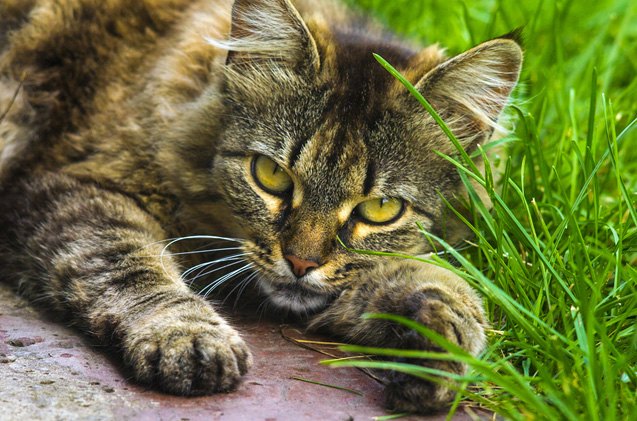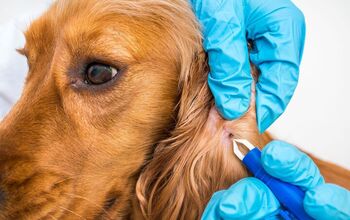What You Should Know About Heartworm in Cats

Just like dogs, cats can become infected with heartworm. But cats are affected differently than dogs, so it’s important to be aware of what heartworm is, what causes it, and what symptoms can occur so you can protect your kitty as best as possible.
What Is Heartworm?
A cat develops heartworm when Dirofilaria immitis, a parasitic worm, get into his body through a mosquito bite. A mosquito can pick up heartworm larvae from an animal, such as a dog infected with heartworm, and then transfer those larvae into a cat’s bloodstream.
It typically takes roughly eight months for heartworm larvae to develop within an infected cat’s body. The cycle starts within the subcutaneous tissues right under the cat’s skin, but then moves to the muscle tissues and eventually into the right ventricle of the heart, as well as the lungs and within arteries.
Related: 3 Veterinary Tests That Every New Cat Should Get
When the parasite matures, it remains, for the most part, within the pulmonary arteries rather than in the heart itself. These arteries carry blood from the heart into the lungs, so heartworm infection will also affect the lungs.
What Are the Symptoms of Heartworm?
Even before the worms are completely grown, they can begin causing problems, anywhere between 60-100 days after infection. When the worms enter the small arteries within the lungs, a severe inflammatory response occurs, causing damage to the arteries, alveoli, and brochioles.
Some infected cats will clear the disease spontaneously, but the infection can steadily progress in many cases, causing nonspecific symptoms that could be very similar to other diseases. Seeing a vet promptly if symptoms occur is the best way to prevent damage and stop this potentially life-threatening infection before it’s too late.
Symptoms of heartworm disease in cats include:
- Coughing
- Asthma-like attacks, difficulty breathing
- Lack of appetite
- Weight loss
- Diarrhea
- Blindness
- Rapid heart rate
- Lethargy
- Vomiting
- Fainting, convulsions, difficulty walking
- Fluid accumulation within the abdomen, chylothorax
These signs could be quite dramatic or very subtle. Also, for some cats, sudden collapse or death is the first sign that there was a problem all along.
How Is Heartworm Diagnosed and Treated?
A vet will typically use blood tests, including a heartworm antibody test and a heartworm antigen test, as well as x-rays and ultrasound imaging, to determine if heartworm infection is present.
Related: What You Should Know About Feline Pancreatitis
Unfortunately, the same treatments that can be used in dogs who are infected with heartworm can’t be used in cats. Currently, there is no medication available that has been approved for treating feline heartworm disease.
In terms of treatment options, if a cat is diagnosed with heartworm but is not exhibiting severe symptoms, he can be monitored closely to see whether the disease will resolve spontaneously.
In instances when a vet has found signs that the disease is within the lungs and blood vessels, the cat could be monitored using x-rays. Also, in felines with clinically confirmed lung disease, supportive therapy with prednisone may be used.
In felines that show apparent symptoms of heartworm, more supportive therapy, such as oxygen therapy, antibiotics, cardiovascular drugs, and fluids, might be prescribed.
The hope is that, by treating the symptoms, the cat could outlive the worms, which can survive in the pet’s body for roughly two to three years. Therefore, long-term treatment is necessary.
Is There a Way to Prevent Heartworm in Cats?
Pet owners can routinely apply medications that are specifically designed for preventing heartworm infection in felines. You can also decrease the risk of a cat becoming infected with heartworm by keeping him indoors at all times, as this will reduce his exposure to mosquitoes.
Because heartworm is such a serious disease, not only in dogs, but also in cats, it’s important to take steps to prevent infection, as well as get prompt treatment if symptoms occur. Talk to your vet to determine which heartworm prevention medication is best for your pet.

Lisa Selvaggio is a freelance writer and editor, and our resident cats-pert, with certifications in pet nutrition and pet first aid. She enjoys producing content that helps people understand animals better so they can give their pets a safe and happy home.
More by Lisa Selvaggio























